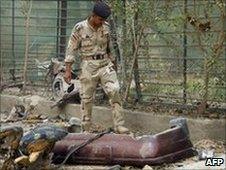Iraqi asylum seekers deported amid safety fears
- Published

The UN refugee agency insists central Iraq is still too unstable
About 10 failed Iraqi asylum seekers from the UK are being flown back to Baghdad despite warnings their lives may be in danger.
The deportation flight is understood to have left from an undisclosed airport at 0515 BST.
The UN refugee agency UNHCR said central Iraq was "very unstable due to the prevailing violence, security incidents and human rights violations".
It says governments should host central Iraqis until it is safe to return.
The flight from the UK was jointly organised by European Union governments and was also scheduled to pick up failed asylum seekers at Halmstad in Sweden.
International protection
UNHCR spokesman Peter Kessler said that the agency was concerned about the removals and that "lives could be at risk" from indiscriminate violence.
"We are asking the Government to continue hosting people from central Iraq until such a time that they can be returned in safety," said Mr Kessler.
"The situation in central Iraq is very unstable due to the prevailing violence, security incidents and human rights violations going on. Their lives could be at risk.''
But in a letter to the High Court shortly before Wednesday's removals, government lawyers said that Iraqi officials had paved the way for the deportations and would receive the men on arrival.
The letter said the flight was lawful, irrespective of any last-minute applications to duty judges.
"The courts have emphasised that in order for someone to qualify for protection… the level of violence would need to be so high that a civilian, irrespective of his or her personal circumstances… would be at risk 'solely on account of his presence in the territory'," said the letter.
Iraq did not meet that test, it said, and therefore deportations should proceed.
"Because of the complexities, practicalities and costs involved in arranging charter flights, it is essential that these removals are not disrupted or delayed by large numbers of last-minute claims for permission to seek judicial review."
The first deportation flight to Baghdad since the start of the Iraq war in 2003, happened last October but proved unsuccessful.
Most of the asylum seekers sent back by the UK government were refused entry because they were Kurdish - and they were immediately flown back to the UK. Separate removals to the Kurdish north have taken place successfully.
'No right'
Matthew Coats, head of immigration at the UK Border Agency, said it only returned those who both the agency and the courts were satisfied did not need protection and refused to leave voluntarily.
"We are determined to remove those with no right to be in the UK," he said.
"In 2008 the courts found that we were able to return people to Iraq. The security situation in Iraq is significantly better now than it was in 2008 and assisted voluntary returns to Iraq have increased every year since 2007."
But Dashty Jamal of the International Federation of Iraqi Refugees said: "If the UK Government wants to stop people fleeing from Iraq, then they need to support a form of Iraqi government that is secular and can guarantee equal citizen rights for all regardless of their nationality and religion, not one which is based on sectarianism."
About 10 failed Iraqi asylum seekers from the UK are being flown back to Baghdad despite warnings their lives may be in danger.